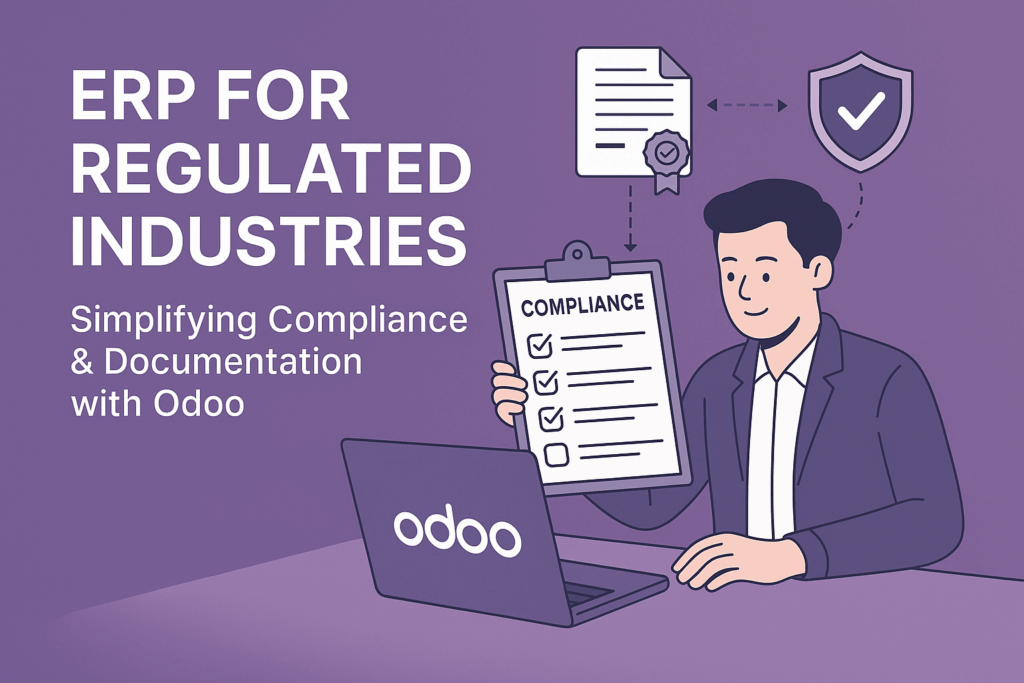ERP for Regulated Industries: Simplifying Compliance & Documentation with Odoo
In heavily regulated industries like healthcare, real estate, and tobacco distribution, maintaining compliance isn’t just about following rules—it’s about avoiding costly fines, legal risks, and operational bottlenecks.
A well-implemented ERP (Enterprise Resource Planning) system can drastically reduce the compliance burden, streamline documentation, and ensure transparent audit readiness. In this article, we’ll explore how Odoo, a powerful open-source ERP platform, is uniquely positioned to support regulated industries through tailored solutions such as Odoo Healthcare, Odoo Real Estate, and Odoo MSA Reporting Software.
Why Regulated Industries Struggle with Compliance
Let’s begin by understanding the common pain points businesses in regulated sectors face:
| Challenge | Description |
|---|---|
| Fragmented Systems | Legacy tools, spreadsheets, and manual logs make it hard to centralize documentation. |
| Changing Regulations | Staying updated with federal, state, and industry-specific compliance laws can be overwhelming. |
| Documentation Burden | Regulatory audits often require historical records, real-time data, and traceability. |
| High Risk of Human Error | Manual compliance processes increase the chance of errors and omissions. |
| Penalties for Non-Compliance | Fines can range from thousands to millions, especially in healthcare and tobacco industries. |
How Odoo Solves Compliance Challenges
Odoo’s modular and highly customizable architecture allows businesses to create workflows that directly address compliance needs. Here’s how it works:
Centralized Data: Odoo integrates all business functions—sales, HR, inventory, finance—into a single platform.
Audit Trails: Every change made in Odoo is logged, creating a reliable audit trail for compliance reviews.
Automated Alerts: Configurable reminders and alerts help businesses stay on top of regulatory deadlines.
Role-Based Access Control: Ensure only authorized personnel can view or edit sensitive records.
Document Management: Digitize and manage SOPs, compliance checklists, certificates, and inspection reports.
Let’s now look at how specific Odoo modules are applied across three regulated industries.
1. Odoo for Healthcare Compliance
Healthcare organizations must comply with stringent regulations like HIPAA, FDA CFR Part 11, and HL7 interoperability standards. Manual tracking of patient data, billing, supply chain logistics, and employee credentials is no longer viable.
Key Benefits of Odoo Healthcare:
Secure Patient Records
Odoo can be customized to handle PHI (Protected Health Information) securely with encryption and access control.Digital Documentation
Maintain surgical logs, prescriptions, lab results, and staff certifications all in one system.Inventory Management for Medical Supplies
Track expiration dates, batch numbers, and lot traceability for FDA compliance.Integrated Billing & Insurance
Automate billing processes and ensure compliance with CMS and insurance regulations.
🔍 Real-World Example:
A private clinic in Texas reduced compliance reporting time by 45% using Odoo’s customized healthcare module—replacing 7 disconnected tools with a unified platform.
2. Odoo for Real Estate Regulatory Compliance
Real estate businesses must navigate complex regulatory frameworks involving property law, zoning codes, tenant privacy, and financial disclosures.
Key Benefits of Odoo Real Estate:
Automated Lease Management
Track contract expiration, renewal dates, and rental payment compliance.Document Centralization
Store inspection reports, licensing documents, insurance policies, and tenant records.Transparency in Transactions
Maintain clean audit trails for transactions to comply with anti-money laundering (AML) regulations.Compliance Dashboard
View real-time compliance statuses for each property under management.
🏢 Use Case:
A Dubai-based real estate developer used Odoo Real Estate to automate RERA document tracking, cutting manual audit prep time by 60%.
3. Odoo MSA Reporting Software for Tobacco Compliance
MSA (Master Settlement Agreement) reporting is mandatory for non-participating manufacturers (NPMs) selling tobacco in the U.S. Failure to comply can result in immediate sales suspension or legal action.
What Makes Odoo MSA Reporting Software Effective:
Automated Report Generation
Produce monthly, quarterly, and annual MSA reports per state requirements.Excise Tax Tracking
Record tobacco sales, taxes paid, and distribution data—vital for audit and escrow compliance.Digital Filing Archive
Keep past submissions and correspondence accessible for audits or legal review.State-Level Configuration
Tailor reporting formats and schedules to match each state’s requirements.
🚬 Real-World Benefit:
A tobacco wholesaler operating in 13 states eliminated 30+ hours per month in manual MSA data entry after integrating Odoo MSA reporting software.
Bonus: Odoo’s Advantages Over Other ERP Systems
Modular Structure: Add or remove features based on compliance needs without overhauling the system.
Cost-Effective: Compared to legacy ERP providers, Odoo offers greater flexibility at a fraction of the cost.
User-Friendly UI: Designed for non-technical users with minimal training.
Scalable: Suitable for small businesses up to large multi-jurisdiction enterprises.
Final Thoughts: Future-Proofing Compliance with Odoo
As regulations tighten across industries, businesses must evolve from reactive compliance to proactive management. Odoo provides a flexible, integrated platform that empowers businesses to automate documentation, minimize legal risk, and maintain audit readiness—all while improving overall efficiency.
Whether you’re managing patient records, rental agreements, or tobacco excise taxes, Odoo gives regulated businesses a much-needed edge in staying compliant, lean, and focused.
Interested in Tailored Compliance Tools?
If you’re in healthcare, real estate, or tobacco distribution and need a custom Odoo implementation, get in touch with our Odoo experts to explore solutions designed for your industry.

